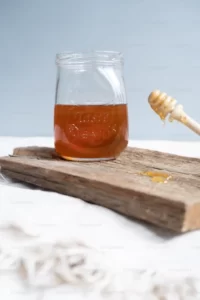Table of Contents
Manuka honey has gained popularity in recent years for its numerous health benefits, including its potential to promote hair growth. In this article, we will explore why manuka honey works effectively for hair growth and how it can be incorporated into your hair care routine.
Why Manuka Honey?
Manuka honey is a special type of honey that is produced by bees from the nectar of the manuka bush, which is native to New Zealand. What sets manuka honey apart is its unique composition and high levels of bioactive compounds, such as methylglyoxal (MGO), which gives it powerful antimicrobial properties.
Antimicrobial Properties
One of the major reasons why manuka honey is effective for hair growth is its antimicrobial properties. Unlike synthetic antibiotics, bacteria cannot build resistance to natural ingredients like manuka honey. It can kill and inhibit a broad spectrum of microbes, including bacteria, viruses, and fungi.
Manuka honey contains high levels of hydrogen peroxide, which contributes to its antiseptic activity. Its acidic and high sugar levels also create an environment that prevents microbial growth. Additionally, manuka honey’s high concentrations of MGO give it unique antimicrobial properties not seen in other honeys.
To enhance its antimicrobial properties, manuka honey is often blended with essential oils that possess several antimicrobial and anti-inflammatory properties. These essential oils work by disrupting the cell membrane of bacteria, inhibiting their colonization of the scalp.
Anti-inflammatory Properties
Inflammation can hinder hair growth by preventing wounds from healing properly and leading to chronic conditions. Manuka honey has anti-inflammatory properties that can help reduce inflammation and promote a healthy scalp environment.
By rapidly treating and clearing wound infections, manuka honey prevents prolonged healing processes or chronic conditions. It is rich in flavonoids and polyphenols, which are antioxidants effective in reducing inflammation. Manuka honey also has autolytic debridement activity, which helps remove dead tissue cells and contaminants, reducing inflammatory stimuli.
Furthermore, manuka honey stimulates the body’s monocytes to secrete cytokines, which signal the mechanisms involved in wound healing. This stimulation can result in the secretion of TNF-alpha, a cytokine that induces wound repair.
Wound-Healing Assistance
Manuka honey’s honey content is hygroscopic, meaning it can draw moisture out of the environment to dehydrate bacteria. Its high viscosity forms a barrier at the wound site, preventing further infection. Manuka honey also reduces the release of reactive intermediates, limiting tissue damage.
Moreover, manuka honey stimulates monocytes, which are precursors of macrophages. The stimulation leads to the secretion of TNF-alpha, a cytokine that induces wound repair. This property of manuka honey can aid in the healing of hair follicles and promote healthy hair growth.
Anti-Fungal Properties
In addition to its antimicrobial and anti-inflammatory properties, manuka honey also exhibits anti-fungal activity. Its high acidic environment creates an inhospitable site for fungi that commonly infect the scalp. Essential oils derived from manuka honey inhibit cellular respiration in fungi and change the fungal cell membrane, making it more permeable and damaging its key properties.
Incorporating Manuka Honey into Your Hair Care Routine
Now that we understand the benefits of manuka honey for hair growth, let’s explore how you can incorporate it into your hair care routine.
-
Manuka Honey Hair Mask: Create a hair mask by mixing manuka honey with a carrier oil, such as coconut oil or olive oil. Apply the mask to your scalp and hair, focusing on the roots. Leave it on for 30 minutes to an hour before rinsing it out with lukewarm water. This mask can help nourish your scalp, reduce inflammation, and promote hair growth.
-
Manuka Honey Shampoo: Look for shampoos that contain manuka honey as an ingredient. These shampoos can help cleanse your scalp while providing the benefits of manuka honey. Use the shampoo regularly to maintain a healthy scalp environment.
-
Manuka Honey Rinse: After shampooing your hair, create a rinse by diluting manuka honey in warm water. Pour the mixture over your hair, focusing on the scalp. Leave it on for a few minutes before rinsing it out with water. This rinse can help promote hair growth and improve scalp health.
-
Manuka Honey Scalp Massage: Warm a small amount of manuka honey between your hands and gently massage it into your scalp. This massage can stimulate blood circulation, nourish the hair follicles, and promote hair growth. Leave the honey on for a few minutes before rinsing it out with water.
Remember to choose high-quality manuka honey with a high MGO rating for optimal results. It is also important to perform a patch test before applying manuka honey to your scalp to ensure you are not allergic to it.
In conclusion, manuka honey’s antimicrobial, anti-inflammatory, and wound-healing properties make it an ideal ingredient for promoting hair growth. By incorporating manuka honey into your hair care routine, you can nourish your scalp, reduce inflammation, and create a healthy environment for hair growth. Try out different methods, such as hair masks, shampoos, rinses, and scalp massages, to find the best approach for your hair. Embrace the natural power of manuka honey and enjoy the benefits it brings to your hair growth journey.



